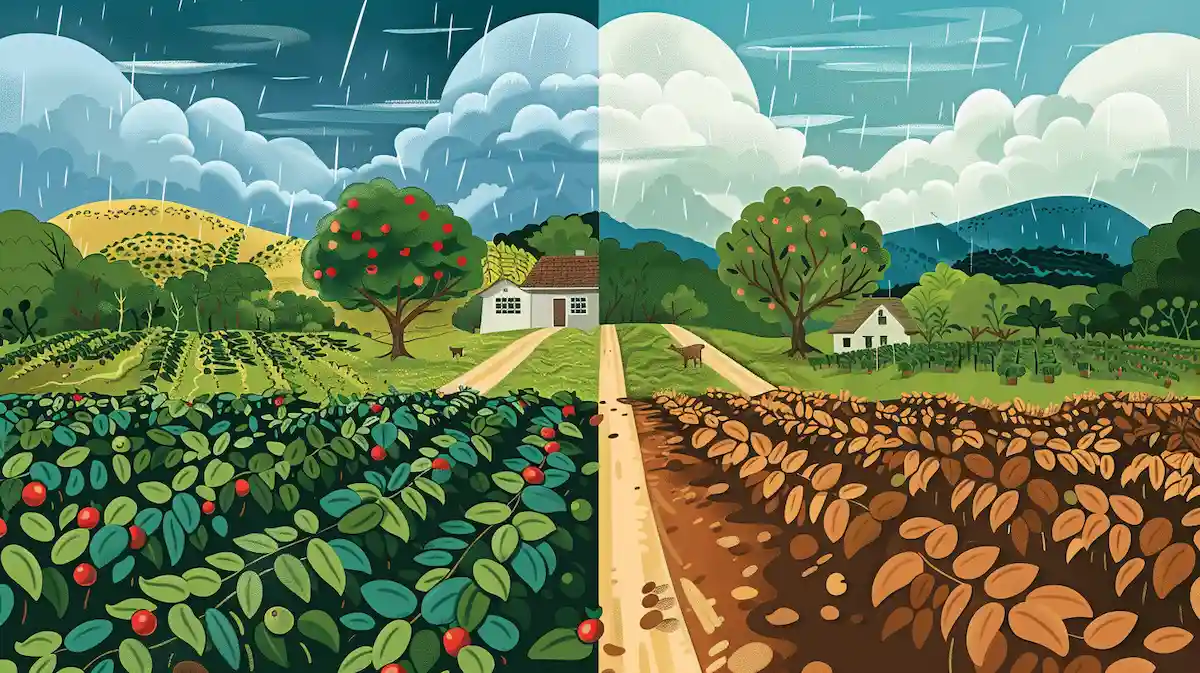英語でコーヒーの2050年問題を紹介します。
実際の英会話例とともに、2050年までにコーヒー生産にどのような影響があるのか、その課題と対策を解説。
コーヒーの2050年問題の理解を深めるとともに、実践的な英会話スキルと関連語彙も身につけることができます。
英語
英会話ダイアローグを読む前に知っておくと良い前提知識と情報は以下の通りです。
- 気候変動の影響
- アラビカ種は気温の変化に敏感で、気候条件が変わると生産量や品質に影響する
- さび病
- さび病はコーヒーノキに影響を与え、湿度と温度の上昇によりそのリスクが増加する
- フェアトレード
- フェアトレードは、生産者が公正な価格で商品を販売できるよう支援する制度
- 新種のコーヒー豆の開発
- 気候変動に強い新種のコーヒー豆の開発が、生産量の確保や品質維持のために進められている
コーヒー価格の上昇とその背景にある気候変動について話しています。
特にアラビカ種コーヒーの生産に影響がある気候変動、フェアトレードの推進、新種のコーヒー豆の開発などを話題にしています。
消費者がフェアトレード製品を選択することの重要性について話しています。
会話 / dialogue

Have you noticed the coffee prices going up recently?

Yeah, it’s becoming a bit expensive. It’s mostly because of climate change impacting coffee production.

Climate change? How does that affect coffee?

Well, the global warming is causing more extreme weather which is really bad for the Arabica coffee beans. They need specific conditions to grow.

That’s troubling! I heard something about diseases too?

Right, there’s this rust disease that’s been spreading more because of the humidity and heat. It’s damaging a lot of coffee crops.

So, what can we do about it? I really don’t want to lose my morning coffee.

One thing we can do is support fair trade coffee. It ensures farmers get fair pay and helps them invest in better farming practices.

Fair trade coffee, huh? Does it help with the climate issues too?

In a way, yes. It supports sustainable farming, which can be more resilient to climate impacts. Also, buying fair trade helps fund research into new coffee varieties that can withstand these changes.

That sounds like a good step. I’ll look for fair trade marks next time.

Definitely. And maybe we can both learn more about these issues. It’s not just about enjoying coffee but also helping those who grow it.

Agreed. Let’s keep this conversation going and maybe spread the word. The more people know, the better we can all help.

Exactly. Every little bit counts, especially when it comes to global issues like this.
関連情報 / related information
「コーヒーの2050年問題」について、理解を深めるための「英語での関連情報」です。
コーヒーの2050年問題

Introduction to the Coffee 2050 Issue
The “Coffee 2050 Issue” refers to the challenges coffee production will face by the year 2050 due to climate change. Rising temperatures and unpredictable weather are expected to significantly impact where coffee can be grown, affecting both yield and quality.
Impact of Climate Change
Global warming poses a serious threat to coffee plants, especially the Arabica variety, which is prized for its flavor. Arabica coffee requires specific climatic conditions to thrive. As the climate changes, suitable coffee-growing areas are shrinking, leading to lower production levels.
Disease and Coffee Plants
Another major concern is the increase in diseases such as coffee leaf rust, which thrives in warmer, more humid conditions. This disease weakens coffee plants and drastically reduces the amount of coffee that can be harvested.
Economic Implications
The decrease in coffee production not only affects the quality and availability of coffee but also the livelihoods of millions of farmers worldwide. As supply diminishes and demand continues to grow, coffee prices are likely to soar, affecting consumers globally.
Mitigation Strategies
To combat these challenges, efforts are being made to develop new varieties of coffee plants that are more resilient to climate change and diseases. Additionally, promoting fair trade practices can help ensure sustainable incomes for coffee farmers, aiding them in adapting to these new challenges.
Conclusion
The coffee 2050 issue is complex, involving environmental, economic, and social elements. Addressing it requires global cooperation and innovation in agricultural practices to ensure that coffee, a beloved beverage worldwide, continues to be available for future generations.
10の質問 / 10 questions
「コーヒーの2050年問題」について、理解を深めるための「英語での10の質問」です。
1: What is the Coffee 2050 problem?
The Coffee 2050 problem refers to the challenges that coffee production will face by the year 2050 due to climate change, including reduced crop yields and quality.
2: Why is climate change a concern for coffee production?
Climate change leads to higher temperatures and altered rainfall patterns, which can harm coffee plants, especially the temperature-sensitive Arabica variety.
3: What is Arabica coffee?
Arabica coffee is a type of coffee known for its smooth flavor and high quality. It grows best in specific, cool and humid climate conditions, which are being affected by global warming.
4: How does climate change affect coffee pests and diseases?
Warmer temperatures and changing humidity levels can increase the prevalence of pests and diseases like coffee rust, which severely affect coffee yields.
5: What is coffee rust?
Coffee rust is a fungal disease that affects coffee leaves, causing them to fall off. It significantly reduces the coffee plant's ability to produce beans.
6: What is fair trade in the context of coffee?
Fair trade coffee is produced under guidelines that aim to provide fair wages to coffee farmers and encourage sustainable farming practices.
7: How does fair trade help address the Coffee 2050 problem?
Fair trade supports coffee farmers financially and encourages sustainable practices that make farms more resilient to climate change.
8: What are some strategies to combat the Coffee 2050 issue?
Strategies include developing and planting coffee varieties that are more resistant to heat and disease, and improving agricultural practices to adapt to changing climatic conditions.
9: How might the Coffee 2050 issue affect global coffee prices?
As coffee supply decreases due to lower yields and the quality of beans is compromised, it is likely that coffee prices will rise globally.
10: What can consumers do to help with the Coffee 2050 problem?
Consumers can support fair trade and sustainable coffee products, which help improve the resilience of coffee farms to climate challenges.
和訳付
会話 / dialogue

Have you noticed the coffee prices going up recently?
最近、コーヒーの値段が上がってることに気づいた?

Yeah, it’s becoming a bit expensive. It’s mostly because of climate change impacting coffee production.
うん、少し高くなってるね。それは主に気候変動がコーヒー生産に影響しているからだよ。

Climate change? How does that affect coffee?気候変動?
それがコーヒーにどう影響するの?

Well, the global warming is causing more extreme weather which is really bad for the Arabica coffee beans. They need specific conditions to grow.
ええと、地球温暖化がもっと極端な天候を引き起こしていて、それがアラビカ種のコーヒー豆には本当に悪いんだ。アラビカ種は成長するために特定の条件が必要なんだ。

That’s troubling! I heard something about diseases too?
それは困ったね!病気についても何か聞いたことがあるよ?

Right, there’s this rust disease that’s been spreading more because of the humidity and heat. It’s damaging a lot of coffee crops.
そうだね、湿度と熱のせいでさび病が広がっているんだ。それが多くのコーヒー作物にダメージを与えているんだ。

So, what can we do about it? I really don’t want to lose my morning coffee.
じゃあ、それについて何ができるの?本当に朝のコーヒーを失いたくないんだ。

One thing we can do is support fair trade coffee. It ensures farmers get fair pay and helps them invest in better farming practices.
できることの一つはフェアトレードコーヒーを支援することだよ。それによって農家が公正な報酬を得ることが保証され、より良い農業実践への投資を助けるんだ。

Fair trade coffee, huh? Does it help with the climate issues too?
フェアトレードコーヒーか。それは気候問題にも役立つの?

In a way, yes. It supports sustainable farming, which can be more resilient to climate impacts. Also, buying fair trade helps fund research into new coffee varieties that can withstand these changes.
ある意味で、はい。それは持続可能な農業を支援しており、気候の影響に対してより強くなれる。また、フェアトレード製品を購入することで、これらの変化に耐えられる新しいコーヒーの品種の研究資金にもなるんだ。

That sounds like a good step. I’ll look for fair trade marks next time.
それは良い一歩だね。次回はフェアトレードのマークを探してみるよ。

Definitely. And maybe we can both learn more about these issues. It’s not just about enjoying coffee but also helping those who grow it.
絶対に。そして、お互いもっとこれらの問題について学ぶことができるかもしれないね。コーヒーを楽しむだけでなく、それを栽培する人々を助けることも大事だから。

Agreed. Let’s keep this conversation going and maybe spread the word. The more people know, the better we can all help.
同意だ。この会話を続けて、もしかしたら他の人にも伝えよう。もっと多くの人が知れば知るほど、私たち全員がより良く助けることができるから。

Exactly. Every little bit counts, especially when it comes to global issues like this.
その通り。少しでも助けることが、このような全世界的な問題には大切だよ。
関連情報 / related information
コーヒーの2050年問題

Introduction to the Coffee 2050 Issue
The “Coffee 2050 Issue” refers to the challenges coffee production will face by the year 2050 due to climate change. Rising temperatures and unpredictable weather are expected to significantly impact where coffee can be grown, affecting both yield and quality.
コーヒーの2050年問題の紹介
「コーヒーの2050年問題」とは、気候変動によって2050年までにコーヒー生産が直面する課題を指します。気温の上昇と予測不可能な天候が、コーヒーの栽培地域に大きな影響を与え、収穫量と品質の両方に影響を及ぼすことが予想されています。
Impact of Climate Change
Global warming poses a serious threat to coffee plants, especially the Arabica variety, which is prized for its flavor. Arabica coffee requires specific climatic conditions to thrive. As the climate changes, suitable coffee-growing areas are shrinking, leading to lower production levels.
気候変動の影響
地球温暖化は、特に風味で高く評価されるアラビカ種のコーヒーノキにとって深刻な脅威となっています。アラビカコーヒーは栽培に特定の気候条件を必要とします。気候が変わるにつれて、適したコーヒー栽培地域が減少し、生産レベルが低下しています。
Disease and Coffee Plants
Another major concern is the increase in diseases such as coffee leaf rust, which thrives in warmer, more humid conditions. This disease weakens coffee plants and drastically reduces the amount of coffee that can be harvested.
病気とコーヒーノキ
もう一つの大きな懸念は、より暖かく湿度の高い条件で繁殖するコーヒーさび病などの病気の増加です。この病気はコーヒーノキを弱らせ、収穫できるコーヒーの量を大幅に減少させます。
Economic Implications
The decrease in coffee production not only affects the quality and availability of coffee but also the livelihoods of millions of farmers worldwide. As supply diminishes and demand continues to grow, coffee prices are likely to soar, affecting consumers globally.
経済的な影響
コーヒー生産の減少は、コーヒーの品質と入手可能性だけでなく、世界中の数百万の農家の生計にも影響を及ぼします。供給が減少し需要が増加し続ける中で、コーヒーの価格は高騰する可能性があり、世界中の消費者に影響を与えます。
Mitigation Strategies
To combat these challenges, efforts are being made to develop new varieties of coffee plants that are more resilient to climate change and diseases. Additionally, promoting fair trade practices can help ensure sustainable incomes for coffee farmers, aiding them in adapting to these new challenges.
緩和策
これらの課題に対抗するために、気候変動や病気に対してより強い新しいコーヒーノキの品種を開発するための取り組みが進められています。また、フェアトレードの実践を促進することで、コーヒー農家の持続可能な収入を確保し、これらの新たな課題への適応を支援することができます。
Conclusion
The coffee 2050 issue is complex, involving environmental, economic, and social elements. Addressing it requires global cooperation and innovation in agricultural practices to ensure that coffee, a beloved beverage worldwide, continues to be available for future generations.
結論
コーヒーの2050年問題は、環境、経済、社会の要素を含む複雑な問題です。これに対処するには、全世界の協力と農業実践の革新が必要で、世界中で愛されているコーヒーが将来の世代にも引き続き提供されるようにするためです。
10の質問 / 10 questions
1: What is the Coffee 2050 problem?
コーヒーの2050年問題とは何ですか?
The Coffee 2050 problem refers to the challenges that coffee production will face by the year 2050 due to climate change, including reduced crop yields and quality.
コーヒーの2050年問題は、気候変動によって2050年までにコーヒー生産が直面する課題を指し、収穫量の減少や品質の低下が含まれます。
2: Why is climate change a concern for coffee production?
なぜ気候変動はコーヒー生産にとって問題なのですか?
Climate change leads to higher temperatures and altered rainfall patterns, which can harm coffee plants, especially the temperature-sensitive Arabica variety.
気候変動により気温が上昇し、降雨パターンが変わることで、特に温度に敏感なアラビカ種のコーヒー植物に悪影響を与える可能性があります。
3: What is Arabica coffee?
アラビカコーヒーとは何ですか?
Arabica coffee is a type of coffee known for its smooth flavor and high quality. It grows best in specific, cool and humid climate conditions, which are being affected by global warming.
アラビカコーヒーはその滑らかな風味と高品質で知られるコーヒーの種類です。それは特定の涼しく湿度の高い気候条件で最もよく成長しますが、それらの条件は地球温暖化の影響を受けています。
4: How does climate change affect coffee pests and diseases?
気候変動はコーヒーの害虫や病気にどのような影響を与えますか?
Warmer temperatures and changing humidity levels can increase the prevalence of pests and diseases like coffee rust, which severely affect coffee yields.
温度の上昇と湿度レベルの変化は、コーヒーの収量に深刻な影響を与えるコーヒーさび病のような害虫や病気の発生率を増加させることがあります。
5: What is coffee rust?
コーヒーさび病とは何ですか?
Coffee rust is a fungal disease that affects coffee leaves, causing them to fall off. It significantly reduces the coffee plant's ability to produce beans.
コーヒーさび病はコーヒーの葉に影響を与える真菌性疾患で、葉が落ちる原因となります。これはコーヒー植物が豆を生産する能力を大幅に低下させます。
6: What is fair trade in the context of coffee?
コーヒーにおけるフェアトレードとは何ですか?
Fair trade coffee is produced under guidelines that aim to provide fair wages to coffee farmers and encourage sustainable farming practices.
フェアトレードコーヒーは、コーヒー農家に公正な賃金を提供し、持続可能な農業実践を奨励することを目的としたガイドラインの下で生産されます。
7: How does fair trade help address the Coffee 2050 problem?
フェアトレードはコーヒーの2050年問題にどのように対処するのですか?
Fair trade supports coffee farmers financially and encourages sustainable practices that make farms more resilient to climate change.
フェアトレードはコーヒー農家を財政的に支援し、気候変動に対して農場をより強靭にする持続可能な実践を奨励します。
8: What are some strategies to combat the Coffee 2050 issue?
コーヒーの2050年問題に対抗するための戦略は何ですか?
Strategies include developing and planting coffee varieties that are more resistant to heat and disease, and improving agricultural practices to adapt to changing climatic conditions.
戦略には、熱や病気に対してより抵抗力のあるコーヒーの品種を開発・栽培すること、及び気候条件の変化に適応するための農業実践を改善することが含まれます。
9: How might the Coffee 2050 issue affect global coffee prices?
コーヒーの2050年問題は世界のコーヒー価格にどのような影響を与えるかもしれませんか?
As coffee supply decreases due to lower yields and the quality of beans is compromised, it is likely that coffee prices will rise globally.
収穫量の減少によりコーヒーの供給が減少し、豆の品質が損なわれるため、世界的にコーヒーの価格が上昇する可能性があります。
10: What can consumers do to help with the Coffee 2050 problem?
消費者はコーヒーの2050年問題にどのように対処できますか?
Consumers can support fair trade and sustainable coffee products, which help improve the resilience of coffee farms to climate challenges.
消費者はフェアトレードおよび持続可能なコーヒー製品を支援することができます。これは気候の課題に対してコーヒー農場の回復力を向上させるのに役立ちます。
words & phrases
英会話ダイアローグと関連情報に出てきた単語・フレーズです(例文は各3つ)。

specific : 形容詞
意味:特定の、明確な。Clearly defined or identified.
(特定の条件や特定の事例を指す際に使用)
例文:
We need specific instructions to complete this task.
「このタスクを完了するためには具体的な指示が必要です。」
Could you give me a specific example?
「具体的な例を教えていただけますか?」
She was looking for a book on a very specific topic.
「彼女は非常に特定のトピックに関する本を探していました。」
ensure : 動詞
意味:確実にする、保証する。Make certain that something shall occur or be the case.
(成果や安全が保証される状態を確実にする際に使用)
例文:
The new policy will ensure the safety of all employees.
「新しい方針で全従業員の安全が確保されます。」
Please ensure that all doors are locked.
「すべてのドアが施錠されていることを確認してください。」
We must ensure our customers are satisfied.
「私たちは顧客が満足していることを確実にしなければなりません。」
resilient : 形容詞
意味:回復力のある、弾力のある。Able to withstand or recover quickly from difficult conditions.
(困難や挑戦から素早く回復する能力を持っている状態を表す)
例文:
Children are often more resilient than adults.
「子供は大人よりもしばしば回復力があります。」
She showed a resilient spirit during the crisis.
「彼女は危機の間、強靭な精神を見せました。」
Resilient materials are essential for earthquake-resistant constructions.
「地震に強い建築には弾力のある材料が必須です。」
withstand : 動詞
意味:耐える、抵抗する。Remain undamaged or unaffected by; resist.
(圧力や困難に対して傷つかず、影響を受けずに耐える様を示す)
例文:
The structure was built to withstand high winds.
「この構造は強風に耐えられるように建てられました。」
Can you withstand the pressure of this job?
「この仕事のプレッシャーに耐えられますか?」
Our team withstood their attack and won the game.
「私たちのチームは彼らの攻撃に耐えて試合に勝ちました。」
yield : 名詞・動詞
意味:産出量、収穫(名詞);産出する、生み出す(動詞)。The full amount of an agricultural or industrial product (noun); produce or provide (verb).
(農業や工業製品の全量またはそれを生産する行為を指す)
例文:
The new farming techniques significantly increased the yield.
「新しい農法が収穫量を大幅に増加させました。」
High-yield crops are essential for feeding the growing population.
「成長する人口を養うためには、高収量の作物が不可欠です。」
This investment is expected to yield a high return.
「この投資は高いリターンをもたらすと期待されています。」
